Mobile devices run everything, from our daily schedules to enterprise-level operations. To efficiently manage and secure corporate mobile devices, businesses turn to mobile device management (MDM) tools. Organizations in various industries already successfully apply such solutions to improve their business processes, secure sensitive data, and win customers’ loyalty.
However, introducing MDM solutions in your IT infrastructure can be challenging. To get the most out of this technology, you need to do thorough research, draw up a required feature set, and choose the most suitable deployment option.
In this article, we discuss the main mobile device management benefits and how businesses can leverage them. We also overview several deployment options and provide advice on how to choose the most suitable approach for your business needs. For instance, we show examples of how different industries and products can benefit from MDM systems, including logistics, healthcare, and mobile control solutions for parents.
Contents:
Why businesses use mobile device management solutions
What is MDM and why should you use it?
Mobile devices allow employees to interact with corporate data and easily keep on with their work. Meanwhile, such devices threaten an organization’s security, as they can be stolen, hacked, or misused. Therefore, IT and security departments should focus on managing and protecting mobile devices within the corporate environment. And this is where mobile device management comes into play.
But before we dive into the opportunities and benefits of MDM, let’s briefly discuss the essence of this technology.
Mobile device management is a complex approach that involves using software as a component to provision mobile devices while protecting an organization’s assets, such as data. Organizations practice MDM by applying software, processes, and security policies to mobile devices and their use. MDM solutions help businesses ensure device inventory, secure application access, protect sensitive data, and filter content.
An MDM solution usually consists of the following components and mechanisms:
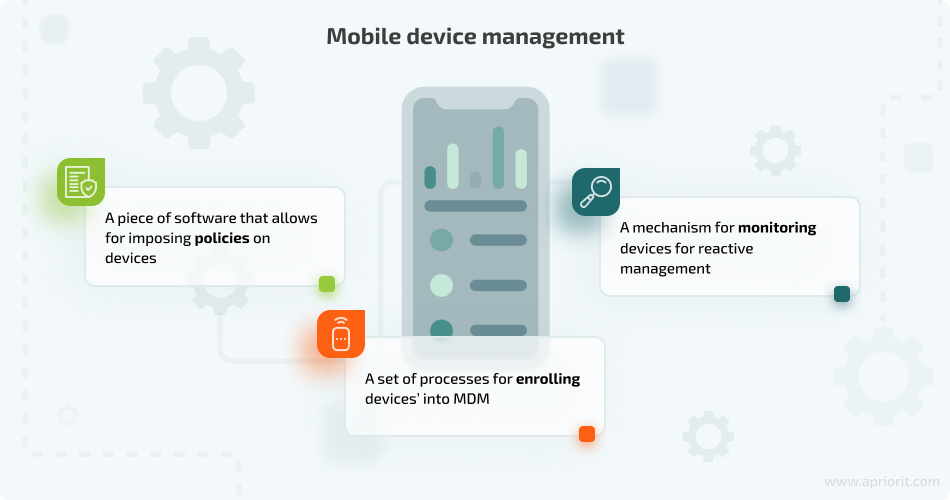
- A piece of software that allows an organization to impose policies on devices: MDM server, device agent
- A set of processes that allow devices to be enrolled into MDM: bulk enrollment of company-owned mobile devices, enrollment of personally owned mobile devices (a bring your own device (BYOD) approach)
- A mechanism for monitoring devices for reactive management: suspicious user activity, device usage statistics, AI-enabled analytics
Why is mobile device management important?
The reasons for organizations to adopt MDM solutions vary, but the three most common are:
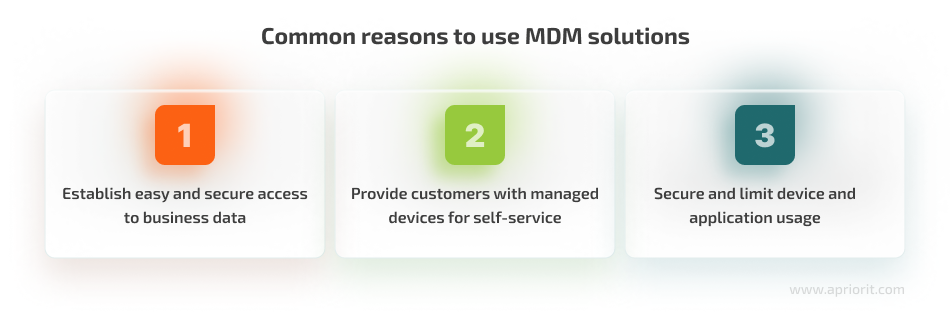
1. Establish easy and secure access to business data for organizations’ employees using various policies such as:
- VPN policies that ensure traffic is encrypted and routed to a company’s service
- Device password policies that ensure device data can only be accessed by users themselves
- Device storage encryption policies that make sure data is safe even if the device is stolen
2. Provide customers with managed devices for self-service, such as to:
- Restrict device functionality to a single task, turning a device into a single-purpose kiosk
- Lock down a device completely after some period of time, restricting usage time or setting specific time frames when the device can be used
3. Secure and limit device and application usage, for example with parental control applications that can:
- Restrict use of certain applications
- Allow and block websites
- Monitor device usage statistics, etc.
These application options can be helpful for different industries, so it’s no wonder MDM development is in demand. According to Gitnux, the MDM market is expected to reach $15.7 billion by 2025. And a significant reason for this popularity could be the large number of gains MDM products bring to businesses and end users.
To get a better understanding of how mobile device management works and learn more about the typical architecture of an MDM solution, check out our article on how to build a mobile device management (MDM) system. Discover useful tips for implementing MDM components and examples of code for Android device management systems.
Let’s explore the key benefits of mobile device management that organizations and individuals can leverage to achieve different goals:
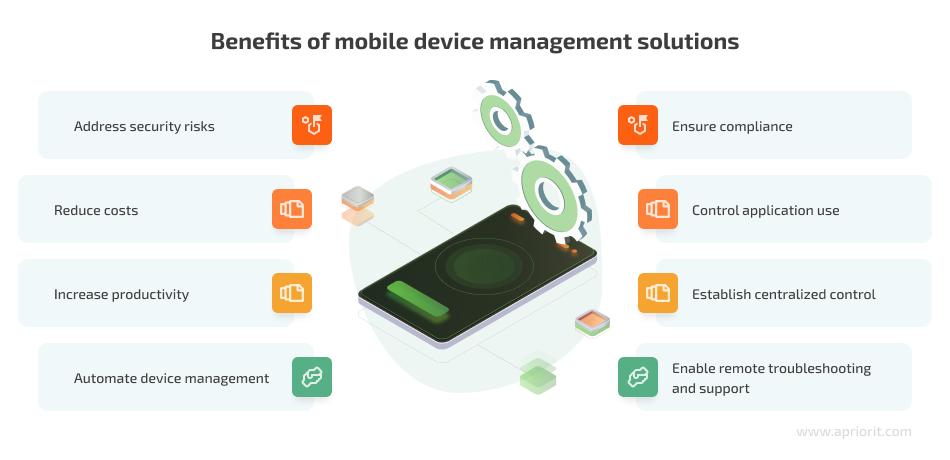
- Address security risks by controlling remote access to highly sensitive data, ensuring robust user authentication, and leveraging features like remote data wiping if a device is lost or stolen.
- Reduce costs by using MDM services for BYOD devices rather than purchasing devices and software for workers and still having to provide device management.
- Increase productivity thanks to the fact that MDM facilitates faster, more efficient collaboration and workflow management while enabling people to work from remote locations as well as the office.
- Automate device management by monitoring devices, watching out for security vulnerabilities, and taking care of IT needs beyond mobility.
- Ensure compliance by providing robust data management and password protection that helps organizations adhere to different regulations, which is especially critical for healthcare, government, and financial industries.
- Control application use by preventing the installation of malicious or unauthorized apps and ensuring that only trusted apps are on company devices. MDM solutions can automatically configure and drop application settings and updates, monitor application usage for compliance, and identify and understand areas for improvement.
- Establish centralized control by providing IT administrators with a centralized platform to manage and monitor a variety of devices, operating systems, and applications involved in a project, as well as to streamline processes and reduce administrative overhead.
- Enable remote troubleshooting and support by allowing IT teams to remotely diagnose and troubleshoot device issues, which is especially useful for remote workers who may encounter technical problems while working on the project.
With the benefits of mobile device management software in mind, let’s dive further into ways to leverage it for your business.
Looking for skilled engineers in custom mobile app development?
Apriorit iOS and Android experts will help you build mobile security, data protection, and synchronization solutions.
What are key MDM deployment options?
Know how to uncover the full potential of MDM
To make sure your organization achieves the benefits discussed above, first you have to choose whether your business requires a custom MDM solution or a ready-to-go product.
Let’s overview the three deployment options for MDM products:
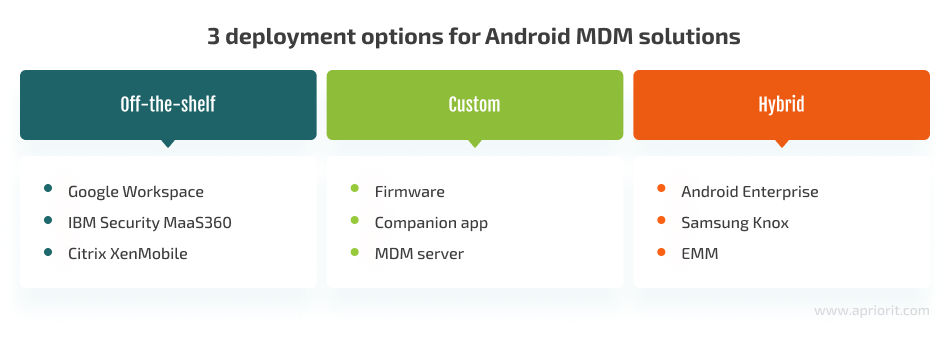
1. Off-the-shelf solutions. A while back, various companies developed MDM solutions to meet the needs of organizations for APIs enabling access to business data from anywhere. The market now offers a variety of ready-to-go MDM solutions, with the most popular being Google Workspace, IBM Security MaaS360, and Citrix XenMobile. However, almost all of these products are business-oriented, and it’s almost impossible to apply them in industry-specific use cases.
2. Custom solutions. Custom development seems to be the most flexible approach to implementing MDM. It helps you avoid all limitations imposed by existing Android APIs or any off-the-shelf solution. A typical fully custom MDM project consists of modified firmware with exposed access to low-level security features, a companion app that can access the exposed API and enforce MDM policies on the device, and an MDM server that pushes and manages policies. On the downside, a custom product requires more time and funds to develop than using an off-the-shelf solution.
3. Hybrid solutions. Last but not least is the hybrid option, for which you can use existing Android APIs to enforce certain policies. Most Android devices on the market come with an API that can be used by various applications that have obtained certain permissions. The application can use an available API to implement all required MDM policies. Common examples are Google API endpoints in Android Enterprise, Samsung Knox, and a generic Android API that’s provided by the custom enterprise mobility management (EMM) approach.
How can you choose the right deployment option?
To get the most business benefits of mobile device management, you need to choose the right deployment model. It has to be tailored to the specifics of your business needs, goals, and the ways end users interact with mobile devices. The key is to ensure a strategic approach to planning MDM deployment and implementation, accounting for your industry when choosing between different deployment options.
In the next section, we overview practical examples of how businesses can leverage MDM technology depending on their industry specifics. We also discuss which deployment options will be the most beneficial and why for each of the analyzed industries. You can implement the same approach when considering MDM platform deployment options for your industry.
Industry-specific benefits of MDM adoption
Learn how to choose the right MDM deployment option for your field
Having successfully delivered MDM projects for companies in various industries, we know what factors and nuances to consider before starting a project.
For example: You have to account for types of supported devices, specifics of security management within an organization, content management policies, and required cybersecurity requirements. All these details may vary significantly for MDM customers from different organizations operating in different industries.
Now it’s time to move from an abstract level to practical examples of getting the most benefits out of MDM adoption. While businesses operating in various fields can have their own advantages from deploying dedicated MDM solutions, we’ll analyze advantages in three specific industries:
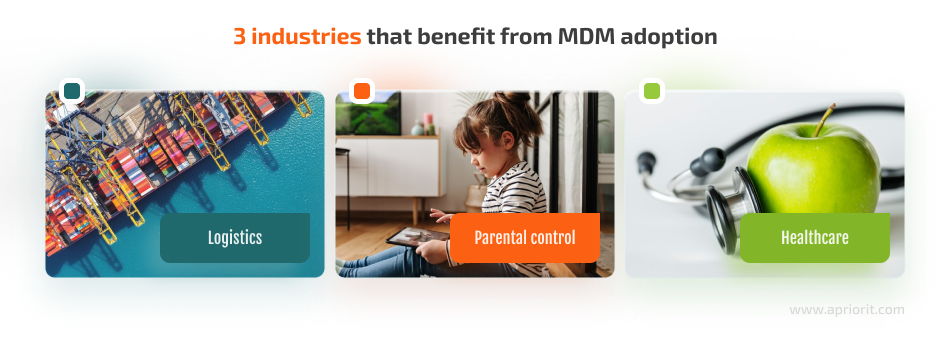
Let’s see what benefits companies in these industries can get from deploying a mobile device management security solution. We’ll also compare the pros and cons of using different MDM deployment options for each case.
1. MDM for logistics
Logistics businesses organize the movement of cargo from one place to another in the most viable, cost-effective, and efficient way. The goal is to deliver products from producers to consumers, however long the supply chain might be. To do that, employees must have access to a lot of critical business information, which can be problematic to do securely and efficiently.
Logistics companies often faces challenges such as the following:
- The workforce is massively distributed, which makes it challenging to ensure efficient communication and cargo transportation.
- Some locations don’t have enough internet bandwidth to efficiently communicate with servers, so there’s a need to store some information on devices locally.
- Employee devices might not have GPS tracking, which can negatively affect planning and tracking.
- Use of mobile devices by employees poses security risks to accessed corporate data, especially if an organization adopts a BYOD policy. Thus, it’s challenging to secure confidential enterprise data, mitigate rooting and jailbreaking attempts, avoid downloading of malicious apps, etc.
By adopting MDM for logistics, companies can:
- Track cargo and employee locations and ensure an open communication network using a single solution
- Efficiently manage a massive number of mobile devices with specific features and functionalities
- Mitigate cybersecurity risks like data loss and data leaks
- Ensure that devices are used strictly for work purposes
- Achieve continuous monitoring of all employee activity
- Keep the entire supply chain connected
Let’s compare pros and cons of each deployment option for MDM logistics solutions.
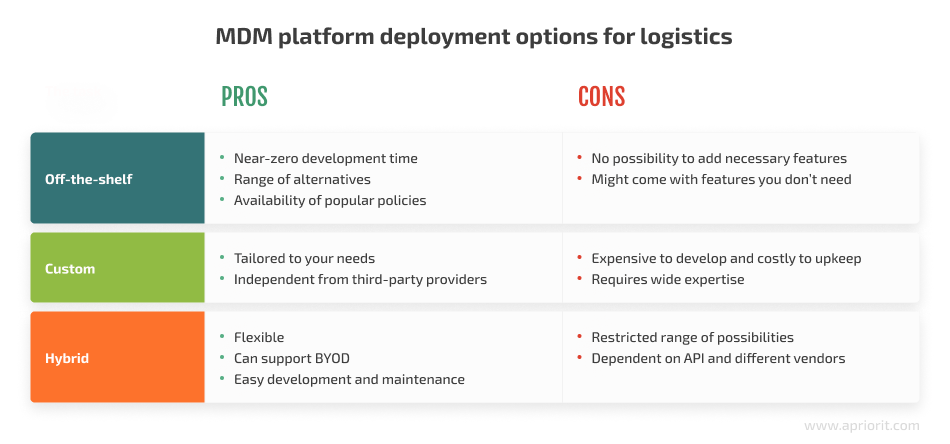
To sum up, a custom solution might be overkill for a logistics company due to high development costs. The only reason to build your own product is a set of specific requirements that are not covered by existing solutions. A hybrid solution is feasible if the required feature set is small enough. And off-the-shelf is a go-to approach in this situation for the majority of logistics businesses.
The set of features to look for when choosing an MDM solution or developing your custom tool varies depending on the specifics of your logistics business. However, the most commonly implemented features are:
- Core functionality that helps you manage, monitor, control, track, and secure mobile devices connected to one extensive network
- GPS-powered fleet tracking that allows you to track all mobile devices and check whether couriers and deliveries are on schedule
- A control feature that limits the use of enrolled mobile devices to a list of allowed apps and websites and blocks access to non-work-related resources
- A remote troubleshooting and device maintenance feature that keeps apps up-to-date and allows your IT department to install apps from anywhere in the world
- Analytics functionality to help your employees analyze huge volumes of data gathered while working with multiple mobile devices across various departments
Related project
Developing a Custom MDM Solution with Enhanced Data Security
Explore a real-life story of creating an enterprise MDM platform for managing Android tablets. Learn how to benefit from a custom solution with enhanced data security.

2. MDM for parental control
Parental control software aims to ensure kids can safely use the internet. To do so, such software filters traffic, blocks access to suspicious and restricted apps and websites, and lets parents decide what types of content their children can interact with.
With the parental control app market steadily growing in recent years, businesses have created new MDM tools to help parents address challenges associated with excessive device use by children:
- Game addiction
- Lack of concentration for educational activities
- Interaction with violent, adult, and other types of content that can be harmful for kids
- Uncontrolled purchases in application stores
With proper MDM solutions in place, you can help your end users:
- Remotely track and manage their child’s activity
- Protect kids from inappropriate content and malicious applications
- Block pop-up screens and deny rights to download and buy apps or upgrades
- Limit screen time to mitigate potential issues with physical and mental health
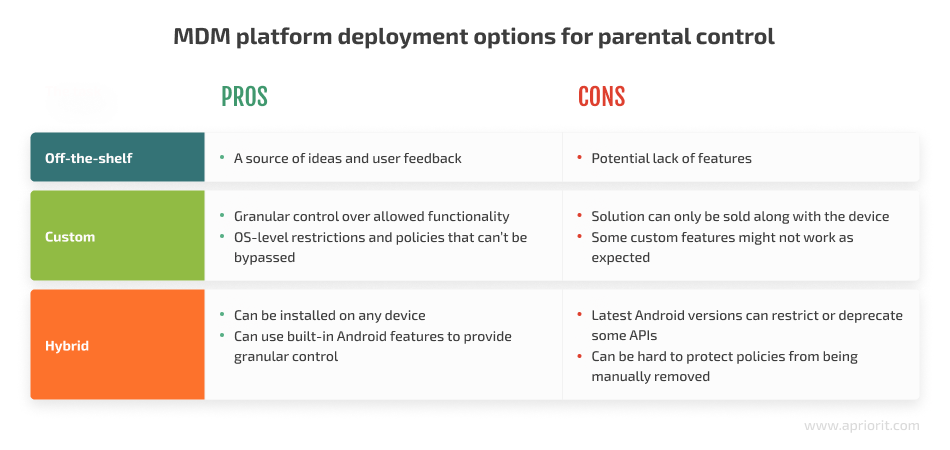
To sum up, a custom approach could be viable when choosing the right hardware. If you choose to go with hybrid solutions, focus on providing unique features to compete with existing solutions. Existing solutions you could integrate with might not have enough features. Also, kids could come up with ways to overcome limitations, and it will take lots of time for product owners to receive feedback, analyze it, and plan and implement relevant upgrades.
At Apriorit, we recommend learning from off-the-shelf solutions, seeing how they perform, and using these observations as ideas for your own custom or hybrid solution.
When planning what features to implement in your MDM solution, stick to your project’s business goals to make sure functionality is aligned with them. That said, the most essential features for almost any parental control application are the following:
- Screen time scheduling to help parents set the allowed number of hours for their kids to use devices, encouraging a healthy relationship with technology and mitigating risks of device addiction.
- Traffic filtering to protect children from harmful and violent content as well as dangerous online content like phishing sites and malware.
- Granular mobile application management to ensure that children can only access resources suitable for their age and maturity level. Parents should be able to create allowlists and denylists of apps and websites a child can interact with, specify which phone numbers a child can receive texts or calls from, review all device activity, block applications, etc.
- Ability to determine the current user to apply a relevant set of rules and access rights depending on whether a parent or child is using the device.
- Blocking of unwanted system activity to secure the product from any system activities that could lead to bypassing or stopping the application. Examples of such activities are changing device VPN settings and performing a factory reset.
Building such complex software as parental control solutions requires thorough research to make sure the final product meets customers’ expectations and provides reliable protection for children. You also need to handle unexpected challenges and pitfalls that might occur during development. Apriorit specialists already have experience creating robust parental control solutions for Android, and you can explore key insights of working on such a project in our case study:
Related project
Building a Complex Parental Control App for Android
Explore how Apriorit helped a software provider create a secure parental control application compatible with the most popular Android devices.

3. MDM for healthcare
Mobile devices greatly help healthcare organizations accelerate and simplify various processes. Mobile apps assist patients, doctors, and other staff members with facilitating communication, provisioning remote services, monitoring patients’ health, handling documentation, and more.
While smartphones help medical professionals increase the efficiency and quality of healthcare services, they also introduce the following challenges for healthcare organizations:
- Security risks like data leakage, theft, and misuse
- Usability issues like having more applications than an employee needs, which might even complicate work
- Compliance risks that might cause legal issues or result in fees and reputational damage
- Need to manage a variety of smartphones, tablets, and other devices along with different operating systems and applications
With a reliable MDM solution in place, organizations and businesses operating in healthcare can:
- Establish adequate data protection
- Provide each employee and patient with the information and access rights they need
- Maintain compliance with laws and requirements like HIPAA
- Ensure centralized device management and proper interoperability with electronic health record (EHR) systems and other healthcare software
- Reduce bureaucracy and provide quick access to medical records
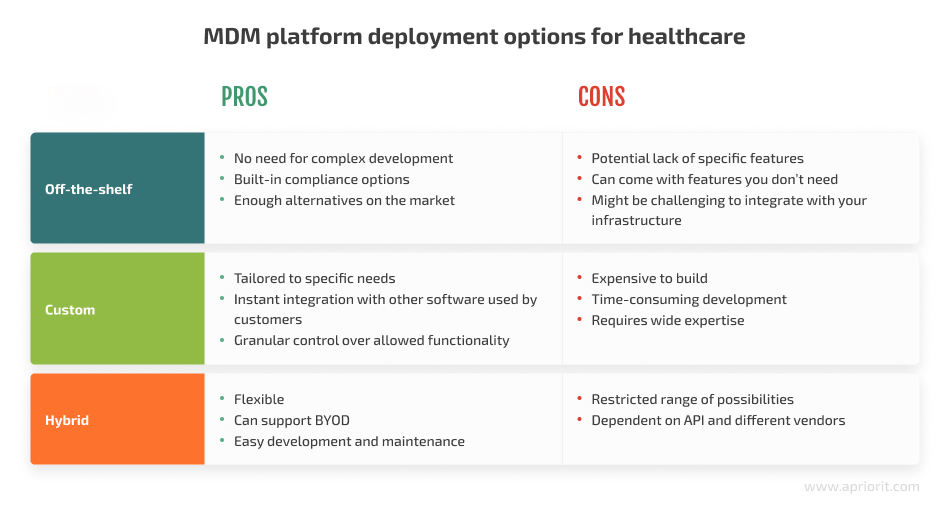
To sum up, off-the-shelf products can be the perfect solution for healthcare organizations with standard needs, as the market offers various options like IBM’s MaaS360 and Scalefusion. But if your organization requires custom features or has specific requirements in terms of supported technologies and integrations, consider choosing a custom or hybrid approach.
When building an MDM solution for a healthcare organization, you need to make it includes the most vital features doctors and administrators need:
To explore more details on how healthcare organizations can benefit from MDM, take a look at our Developing a Secure MDM Solution for Healthcare article. Find out how to build a secure healthcare MDM project and what challenges to expect along the way.
Conclusion
Using MDM technology is a great way to manage all of your mobile devices and protect business data. But to win from the time-saving benefits of mobile device management, you need to correctly introduce this approach into your infrastructure. And creating decent MDM and MAM solutions hides many pitfalls.
You need to wisely choose deployment options, thoroughly plan functionality that aligns with your business goals and security requirements, and keep in mind the specific industry you operate in.
At Apriorit, we have professional mobile app development teams experienced in different vectors, including working on secure MDM solutions. We will gladly assist you with planning a relevant feature set, choosing the suitable technology stack, and developing robust software that will meet your business needs and provide a solid user experience.
Want to build a reliable and secure MDM product?
Start your project’s journey today with Apriorit’s professional team. Our engineers are ready to deliver an efficient MDM system tailored to all your requirements.


